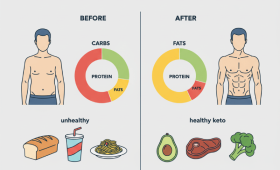Today, the desire for quick results also extends to weight loss goals. Headlines like “shock diets” and “recipes that make you lose 10 kilos in 7 days” attract the attention of many people. However, fast weight loss is a serious issue that comes with potential risks. In this comprehensive guide, we will examine what fast weight loss means, which methods are scientifically supported, and most importantly, how you can make this process safe and sustainable, step by step.
What is Fast Weight Loss?
Fast weight loss refers to losing more than 1 kilogram per week in a short period. This can be a process that lasts for a few weeks or months. Dietitians and health experts generally state that losing between 0.5 and 1 kg per week is ideal and healthy. This rate helps the body maintain its balance of both fat and muscle mass. However, in some special cases (for example, before bariatric surgery or for a serious health condition), faster weight loss programs may be applied under a doctor’s supervision. The main mechanism of fast weight loss is to create a very large calorie deficit. This means taking in much fewer calories than you normally burn, causing your body to use stored fat to meet its energy needs. However, in this process, the body can lose not only fat but also water and muscle mass. Therefore, the content and follow-up of fast weight loss diets are very important.
Water Loss vs. Fat Loss
A large part of the dramatic results seen in the first few days or weeks of fast weight loss programs is actually due to water loss. This is especially evident in diets where carbohydrate intake is severely restricted. Every gram of carbohydrates in the body holds about 3-4 grams of water. When carbohydrate stores (glycogen) are used up, the water attached to these stores is also released and excreted through urine. This leads to a rapid drop on the scale. Fat loss, on the other hand, is a slower process. To lose 1 kilogram of fat, the body needs to create a calorie deficit of about 7700 calories. This corresponds to a fat loss of 0.5-1 kg per week with a daily deficit of 500-1000 calories. When aiming for fast weight loss, it is important to remember that the numbers you see on the scale can be misleading. The real goal is to reduce body fat percentage. Therefore, instead of just looking at the scale, using a tape measure or getting a body fat analysis is a healthier tracking method.
Creating a Calorie Deficit
The basic principle of weight loss is to create a calorie deficit. This means you consume fewer calories than you burn daily. For example, if you burn 2000 calories a day, you create a 500-calorie deficit by consuming 1500 calories. The size of this deficit directly affects your weight loss speed. However, a very large deficit (e.g., consuming less than 1000 calories a day) can cause the body’s metabolism to slow down and lead to muscle loss. This makes long-term weight loss more difficult. A safe calorie deficit can usually be created by consuming 500-750 fewer calories than your daily energy needs. You can use various online tools or seek help from a dietitian to calculate your calorie needs. In fast weight loss diets, this deficit can be kept larger, but this should be done for a short period and under expert supervision.
Low-Carb and Ketogenic Diets
Low-carb diets are popular methods for fast weight loss. The main goal of these diets is to severely limit carbohydrate intake to make the body use fats as an energy source instead of glucose. The ketogenic diet is an extreme version of a low-carb diet. In this diet, carbohydrate intake is limited to 20-50 grams per day. The body enters a metabolic state called ketosis, using ketone bodies for energy. This state can reduce appetite and encourage fast weight loss. However, the ketogenic diet can cause side effects such as headaches, fatigue, and digestive problems. It can be difficult to sustain in the long term and has potential effects on kidney health. Therefore, you should consult a doctor or dietitian before starting a ketogenic diet.
Intermittent Fasting
Intermittent fasting is an eating pattern that focuses on when you eat, rather than what you eat. The most popular methods are 16:8 (fasting for 16 hours, eating for 8 hours a day), 5:2 (eating normally for 5 days a week, consuming very low calories for 2 days), and 24-hour fasting (fasting for 24 hours 1-2 times a week). Intermittent fasting can help with weight loss by naturally restricting calorie intake. It can also increase insulin sensitivity and activate the body’s fat-burning mechanism. Because intermittent fasting is a flexible method, many people find it sustainable. However, you may experience extreme hunger or fatigue, especially during fasting hours. Not turning to unhealthy foods outside of fasting hours is the key to success.
The Importance of a Protein-Rich Diet
Protein plays a vital role in fast weight loss diets. Protein helps preserve muscle mass and prevents muscle loss. Muscles are one of the most active tissues that speed up metabolism. Therefore, muscle loss can cause metabolism to slow down and weight loss to stall. Also, protein is the most satiating macronutrient. A protein-rich meal can increase the feeling of fullness, helping you consume fewer calories. Studies show that people who increase their protein intake automatically consume fewer calories. Including plenty of protein sources such as meat, fish, chicken, eggs, legumes, and dairy products in your diet supports both the fast weight loss process and helps you achieve a healthy body composition.
Vegetables and Fibrous Foods
Fast weight loss diets can often lead to nutrient deficiencies due to calorie restriction. Therefore, it is extremely important to consume plenty of vegetables and fibrous foods. Vegetables are low in calories but rich in vitamins, minerals, and fiber. Fiber helps the digestive system work regularly, increases the feeling of fullness, and balances blood sugar. Prioritizing low-calorie, high-fiber vegetables like broccoli, spinach, lettuce, zucchini, and cucumber in your diet allows you to create both filling and nutritious meals. Additionally, whole grains, legumes, and fruits are also good sources of fiber.
Avoiding Refined Sugars
Sugar is one of the biggest factors in weight gain. Refined sugars are absorbed quickly in the body, cause a rapid rise in blood sugar, and lead to insulin release. This, in turn, causes a drop in blood sugar and the reappearance of hunger. Also, refined sugars are a source of empty calories; they carry no nutritional value. Sugary drinks, sweets, cakes, white bread, and processed foods are products that should definitely be avoided when aiming for fast weight loss. Instead, satisfying your sweet cravings with fresh fruits is a healthier option.
Hidden Calories: Pay Attention to Drinks
Many people pay attention to the foods they eat but overlook the drinks they consume. However, sugary drinks, fruit juices, alcohol, and flavored coffees contain a significant amount of “hidden calories.” For example, a glass of sugary fruit juice can have as many calories as a whole meal. Since these drinks do not create a feeling of fullness, they can easily lead to overconsumption. The best drink during a fast weight loss process is water. Water speeds up metabolism, provides a feeling of fullness, and supports the body’s detoxification processes. Additionally, unsweetened herbal teas and plain coffee can also be consumed.
The Art of Portion Control
Creating a calorie deficit is essential for fast weight loss, but one of the easiest ways to create this deficit is through portion control. Very large portions can cause you to unknowingly exceed your calorie limit. You can follow a few simple rules to ensure portion control:
- Eat your meals on smaller plates. This makes the portion look bigger.
- Start your meal with a bowl of salad or vegetable soup. This helps you feel fuller when you move on to the main course.
- Eat your meals slowly and chew each bite well. The brain sends the satiety signal after about 20 minutes.
- At restaurants, pack half of the main course or share a portion with a friend.
- Be sure to read the portion information on packaged products and stick to it.
The Role of Exercise: Cardio vs. Weight Training
Exercise is one of the most important factors supporting the fast weight loss process. It is possible to lose weight with diet alone, but exercise speeds up this process and prevents muscle loss. Cardio exercises (running, swimming, cycling) increase calorie burn and improve heart health. Doing 30-60 minutes of cardio a day can help you create a significant calorie deficit. Weight lifting or resistance exercises protect and increase muscle mass. Having more muscle mass raises your resting metabolic rate, meaning you burn more calories. An ideal fast weight loss program should include both cardio and weight training. A strategy of doing weight training 3-4 days a week and focusing on cardio on other days can be effective.

Sufficient Sleep and Weight Loss
Sleep is a factor often overlooked in the weight loss process. Insufficient sleep increases cortisol (the stress hormone) levels and negatively affects hormones that regulate appetite (ghrelin and leptin). Ghrelin is a hormone that increases the feeling of hunger; leptin sends a satiety signal. In people who do not get enough sleep, ghrelin levels rise and leptin levels fall, which leads to an increased desire to overeat. Also, fatigue reduces the motivation to exercise and increases the tendency to consume more calories throughout the day. Getting 7-9 hours of quality sleep each night is vital to achieving your weight loss goals.
Stress Management and Weight
Chronic stress can lead to weight gain. When you are stressed, your body secretes the hormone cortisol. High cortisol levels encourage fat storage, especially in the abdominal area. Also, many people try to manage stress by eating or with “emotional eating.” This leads to turning to unhealthy foods and an increase in calorie intake. During a fast weight loss process, it is important to find methods to manage your stress levels, such as meditation, yoga, breathing exercises, or making time for your hobbies.
Supplements and Weight Loss
Weight loss supplements are quite common on the market, but most of them do not have a scientifically proven effect, and some can be harmful. Some supplements are claimed to speed up metabolism or suppress appetite. However, it is vital to consult an expert before using these supplements. The safest “supplement” is actually nutritional support like protein powder. Protein powder is a practical way to increase your protein intake and can help preserve muscle mass. Multivitamins can be beneficial to prevent vitamin and mineral deficiencies that may occur due to calorie restriction.
Dealing with Weight Loss Plateaus
It is quite common for your weight loss rate to stall (a plateau) after a while in a fast weight loss process. There can be several reasons for this. First, as you lose weight, your body’s calorie needs decrease. If you were burning 2000 calories at the beginning, this amount might drop to 1800 after losing 10 kilos. In this case, if you continue with the same calorie intake, your calorie deficit shrinks, and weight loss slows down. Second, the body’s metabolism may slow down to protect itself. To break this plateau, you can try a few strategies:
- Recalculate your calorie intake and re-create your calorie deficit.
- Change your exercise routine or increase its intensity.
- Practice “calorie cycling”; consume fewer calories on some days and more on others.
- Review your sleep patterns and stress levels.
Potential Risks of Fast Weight Loss
Fast weight loss can carry some health risks. The most important of these are:
- Muscle Loss: If not enough protein is consumed and exercise is not done, the body can use muscle tissue for energy.
- Nutrient Deficiencies: Calorie restriction can lead to vitamin and mineral deficiencies, which can cause fatigue, hair loss, and a weakened immune system.
- Slowing Metabolism: The body slows down its metabolism to protect itself when calorie intake is reduced. This makes weight gain easier after the diet.
- Gallstone Formation: Very fast weight loss can increase the risk of gallstone formation.
- Dehydration: Water loss, especially in the initial stages, can cause the body to become dehydrated.
Because of these risks, it is recommended that fast weight loss diets be undertaken under the supervision of a doctor or dietitian.
Sustainability: Beyond the Diet
The biggest challenge of fast weight loss diets is that they are not sustainable. A very restrictive diet is often abandoned after a while, and this causes the lost weight to be rapidly regained. This is called the “yo-yo effect.” To get lasting results after losing weight quickly, you need to adopt a lifestyle change. This means gaining long-term, balanced, and healthy eating habits, not just a short-term diet. Planning your meals, preparing healthy snacks, and making healthy choices at social events will help you achieve this sustainability.
Seeking Expert Support
If you have fast weight loss goals, seeking support from an expert is the right approach. A dietitian can create a personalized nutrition plan for you, prevent nutrient deficiencies, and help you stay motivated. They can also detect potential health problems you might encounter during the weight loss process. Expert guidance ensures you get both safer and more effective results.
Success Stories and Motivation
The weight loss journey can be challenging at times. You can get inspiration from success stories to keep your motivation high during this process. Listening to the experiences of people around you, joining online communities, or following healthy lifestyle accounts on social media can inspire you. Also, celebrating your own small successes increases your motivation. For example, a small drop on the scale, a piece of clothing fitting you better, or being able to do an exercise more easily gives you the strength to continue your journey.
An Example Fast Weight Loss Plan
This plan is a general example and should be changed according to individual needs. Be sure to consult an expert before starting.
- Daily Calorie Goal: Based on your individual needs, consume 500-750 fewer calories than your daily calorie needs.
- Macronutrient Distribution: Eat a protein-rich diet. About 30-40% of your daily calorie intake can consist of protein, 30-40% from healthy fats, and 20-30% from complex carbohydrates.
- Sample Menu:
- Breakfast (08:00): 2 boiled eggs, a handful of avocado, and a salad with plenty of greens.
- Lunch (13:00): Grilled chicken breast or fish (150-200 grams) with steamed broccoli and brown rice (half a cup).
- Snack (16:00): A handful of hazelnuts or almonds.
- Dinner (18:30): Lean red meat or lentil soup, with a large salad.
- Exercise:
- Monday: 30 minutes of brisk walking and 30 minutes of weight training (upper body).
- Tuesday: 45 minutes of light-paced cycling.
- Wednesday: 30 minutes of weight training (lower body).
- Thursday: 45 minutes of swimming or cardio.
- Friday: 30 minutes of weight training (full body).
- Saturday & Sunday: Active recovery (light walking, yoga).
- Water: Drink at least 2-3 liters of water a day.
- Sleep: Aim for 7-9 hours of quality sleep each night.
This guide provides a general overview of fast weight loss. Remember that everyone’s body is different, and a personalized approach is required for the best results. Professional support is always recommended for healthy and lasting results.



